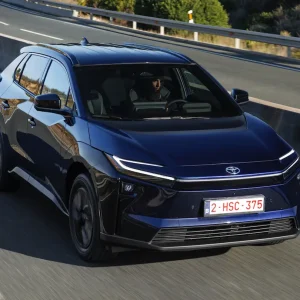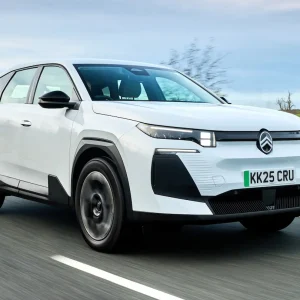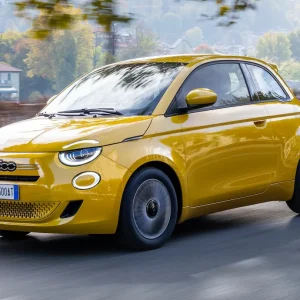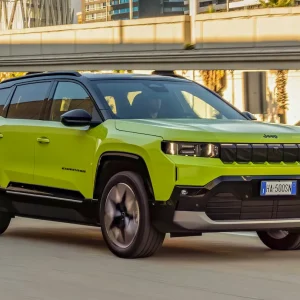Looking the part
Hyundai’s i30 certainly isn’t short of appeal, especially when you consider its standard creature comforts, comprehensive safety kit and competitive running costs. That said, it’s not exactly the kind of car that will turn heads in the corporate car park.
Hyundai hopes that situation is about to change, as it introduces a new Fastback model to the i30 line-up.
Although it shares the majority of its mechanical components with the established hatchback, the Fastback is 115mm longer, while its roofline is lowered by a toupee-challenging 25mm.
Together with a slimmer grille, tapering roofline, wrap-around rear lights and jaunty rear spoiler, the additional stretching gives the Fastback a lower, sleeker appearance that distinguishes it from its more workmanlike sibling.

Style over substance, then?
Although the Fastback is longer and costs £500 more than the equivalent hatchback, it doesn’t provide any additional legroom inside. What it does give you is greater boot volume – allegedly. At 450 litres, the boot is said to be significantly larger than the i30 hatchback’s 395 litres. This is a slightly spurious claim, however, as the boot floor sits atop a space-saver spare wheel and a deep polystyrene storage unit. As a consequence, you have a shallow load bay that is arguably less usable than the hatchback’s. Things don’t get any better when it comes to loading, as a high boot lip leads to a bicep-boosting exercise even when loading light shopping bags.
At least the rear seats have a 60/40 split fold, so you’ll still be able to transport your weekend DIY requirements home without resorting to a roof box rental. Not surprisingly, headroom has suffered – especially for those in the rear – but the cabin is still spacious enough for four in terms of leg and elbow room. What’s more, given the typical slouching attitude of your average rear-seat juvenile, it’s a wonder that manufacturers expend so much energy creating lots of rear headroom.
Rear visibility is a bit more of a concern, as those hefty rear-quarter panels and shallow rear screen create significant blind spots.
Partial compensation comes from a rear-view camera as standard, but because there’s no rear wiper, the rear-view mirror view turns blurry at the first hint of
liquid sunshine.
Up front, the Fastback’s layout is identical to the established line-up’s, so you get the same sturdily built dashboard and door trims. It’s not in the same league as a Volkswagen Golf for material quality, but you do get clear instrumentation, and a large 8in infotainment screen.

On the road
With the promise of a Euro-6-compliant diesel engine in the summer, initially, there will be a choice of just two petrol engines: a three-cylinder 120hp 1.0 and a four-cylinder 140hp 1.4 unit. The latter can be specified with a smooth seven-speed twin-
clutch automatic.
The 120hp 1.0 will make up the majority of sales, however, and although it’s not the smoothest three-cylinder – it does create a fair bit of vibration that can be felt through the floor and the steering wheel at lower revs – it seldom feels short of puff, creating strong low-end pulling power allied to a willingness to rev hard.

It’s also a breeze to drive in traffic, thanks to its smooth manual gearbox and a light, positive clutch pedal.
Along with its lower roofline, the Fastback is fitted with stiffer and slightly lower suspension. The rear can feel jittery over rougher surfaces, but the bonus is significantly improved driving enjoyment. The car feels immediately more alert, due to sharper turn-in to corners and notably less body roll, leading us to wonder why the i30 hatchback wasn’t blessed with these same settings from the outset.

If anything, Hyundai’s engineers may have got carried away with their new-found licence to sharpen things up, because the impressively powerful brakes require a mere gnat’s pressure to exact a tenacious bite.
The Fastback is far from a pacesetter in what is an insanely competitive sector but it is a very decent all-rounder.
The styling enhancements have certainly helped it stand out from the crowd, and it’s all the better for being that little bit sharper and more engaging to drive.
Hyundai i30 Fastback 1.0T GDi Premium SE
P11D £23,190
On sale January 2018
Residual value 30.5%
Depreciation £16,115
Fuel £6,062
Service, maintenance and repair £1,755
Cost per mile £53.5p
Fuel consumption 54.3mpg
CO2 (BIK band) 120g/km (23%)
BIK 20/40% a month £89/£178
Boot space 450 litres
Engine size/power 998cc/120hp





